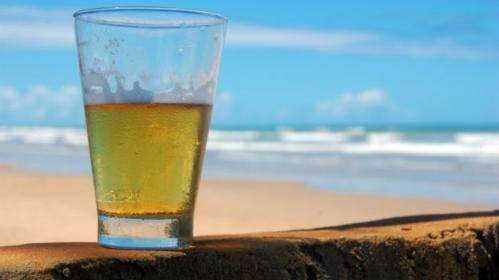Why today's reports about skin cancer and alcohol are misleading

(Medical Xpress)—Let's be clear – drinking alcohol carries health risks.
It causes seven different types of cancer. And the more we cut down on alcohol, the more we reduce our risk of the disease.
But while we'd certainly like people to be more aware of the link between alcohol and cancer, we also believe in good quality evidence. And that's why today's newspaper headlines linking drinking and the most serious form of skin cancer, malignant melanoma, bothered us.
Because the evidence simply isn't strong enough to link the two.
What triggered the headlines?
The headlines originate from a study published today in the British Journal of Dermatology, which concluded that people who regularly drink alcohol had a 20 per cent higher risk of developing malignant melanoma than people who don't drink or drink only occasionally.
This study was a meta-analysis, meaning it brought together the results of many different studies to get a better idea of the relationship hidden in all the data.
This meta-analysis included all the studies published before April 2012 that looked for a relationship between drinking alcohol and developing melanoma – 16 in total, which is a fairly small number for this type of analysis.
A meta-analysis can be a powerful statistical tool, but it can't compensate for poorly designed or carried out studies. Or, to borrow a phrase from computer science, garbage in, garbage out.
The studies in this meta-analysis were by no means all garbage, but they weren't perfect either.
The results could be explained by too much sun
As the researchers acknowledge – but most of the media coverage doesn't – there are some big limitations to this particular analysis.
Most skin cancers are caused by exposure to too much UV, so studies looking for a link between melanoma and something else, like alcohol, need to factor people's sun exposure in.
When the researchers only included the 10 studies that took people's sun exposure into account too, the result was no longer statistically significant – meaning that the results could just be down to chance.
This is a very important result when it comes to interpreting the findings of this study – it means that the researchers only found a link that looked statistically real if they included the poorer quality studies that didn't take level of sun exposure into account.
Risky behaviours group together
Even if there is a link between alcohol and melanoma, it isn't necessarily the case that alcohol is causing melanoma to develop. The two things could be closely linked for some other reason that isn't accounted for in the studies.
One interesting possibility is that people who have risky behaviour in one respect also tend to behave riskily in other areas. So people who have riskier behaviour around alcohol, and drink over the recommended limits, may be more likely to set out to get a suntan, either by using sunbeds or by sunbathing.
And this might not have been captured by the research questions in the studies.
Cutting back on alcohol is still a good idea
While alcohol may not cause melanoma, it has been show to increase the risk of many serious diseases. And we'd certainly encourage people to cut down their drinking, so any offputting headlines could be considered good.
But it's important the public are given a clear picture of what the balance of evidence tells us, especially if they're to trust health advice and information in the future. The evidence unequivocally shows it's a good idea to cut back on alcohol and reduce the amount you drink in the long term.
Doing so will reduce the risk of seven different cancers – mouth cancer, pharyngeal cancer, oesophageal cancer, laryngeal cancer, breast cancer, bowel cancer and liver cancer – but probably not melanoma.
Cutting back on sun exposure is important, too
Despite our problems with the headlines, this analysis has an important message.
It underlines the fact that by far the most important risk when it comes to melanoma is being exposed to too much UV light – whether that's from the sun or through using sunbeds. Our study found that in the UK more than four in five melanomas are caused by excess UV exposure.
The best way to cut the risk of the disease is to avoid sunbeds and enjoy the sun safely. Although the UK January sun wouldn't normally be strong enough to cause sunburn, remember to protect yourself if you're skiing or heading abroad for some winter sun.


















